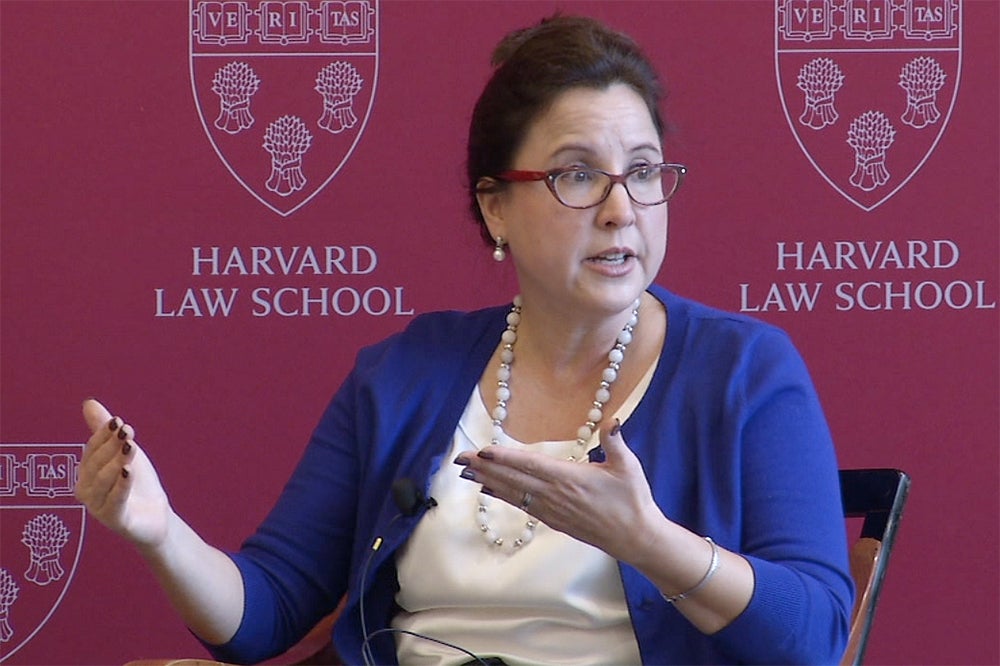According to Dean Martha Minow, Commissioner Nancy Ramirez ’90 of the Los Angeles Superior Court was always meant to come back to her alma mater, although originally in a teaching capacity. In fact, Ramirez was set to teach a course called Litigation and Legislative Strategies for Latino Civil Rights Advocacy this Fall when she received the very news she had warned Dean Minow might stand in the way of her coming to back to Harvard: she was elected to sit as a judicial officer.
Thus, Minow invited her to visit HLS in another capacity. On Wednesday, Oct. 22, Minow hosted a Q&A session with Ramirez, her former student, at an event sponsored by the Black Law Students Association, La Alianza and The Journal on Racial and Ethic Justice. Their conversation covered a wide range of topics, including Ramirez’s path to becoming an attorney, her time as the Western Regional Counsel for the Mexican American Legal Defense and Educational Fund (MALDEF), and the similarities between impact litigation and direct client services.
Ramirez, the child of two immigrants from Mexico, described her parents’ focus on education. “Don’t be the nurse,” her father told her from a young age. “Be the doctor.” She described how, as part of the judicial application process, she was asked what prompted her to do public interest work. In considering the answer, Ramirez said, she came to realize the major role that had been played by her mother, whom she watched serve as a makeshift advocate for a network of family and friends with issues ranging from immigration concerns to fighting back against scam artists.
Speaking of her time at MALDEF, Ramirez described her favorite case: Mendoza v. Tucson Unified School District, a longstanding desegregation case filed by MALDEF in 1974. The case had settled in 1978, with the Tucson school district agreeing to address ongoing segregation and discrimination within its school systems, with regular updates on its progress. After Tucson decided to comply with a 2010 Arizona law that essentially banned schools from teaching ethnic studies by suspending classes on Mexican-American studies, however, MALDEF challenged the school district’s decision as a violation of the standing consent decree to desegregate the city’s schools. In February 2013, MALDEF won, with a federal judge ruling that Tucson had failed to address ongoing segregation and discrimination within its schools and upholding a section of the settlement that called for a curriculum that reflected the Mexican American community.
Contrasting impact litigation work with her experience doing direct legal services, Ramirez said that she had also found direct work with individual clients extremely rewarding. “That kind of work is just as valuable and just as important,” she said. “You’re not just dealing with that one individual. There’s a ripple effect on the entire family. You’re educating the client about … how important it is for them to stand up for themselves, and that they deserve a certain amount of respect and dignity that they didn’t get when they were defrauded, or harmed by their partner.”
One student asked Ramirez how she approached shaping a career advocating on behalf of people and issues she cared deeply about while leaving the door open to one day becoming a “neutral” judge. Ramirez explained that she had never created such a long-term plan, and had instead focused on the opportunities that excited her as her career unfolded. Furthermore, she explained, judges are not necessarily neutral. “Judges have to follow the law,” she said. “But you can have the same set of facts, have four different judicial officers look at those facts, and come up with four different outcomes, decisions, and rationales for them. A lot of the time it’s based on their value systems.”
